#The American Dream
Text
Folks going "WHAT they made a show about the Fallout franchise?? I've been hearing people say Bethesda messed it up, but I haven't watched it myself, so I'm going to trust the word of other people -- some of which also haven't finished watching it" is driving me insane.
Being a hard core fan of something obviously brings with it a lot of passionate feelings when adaptations come into play. Of course, there's going to be people going "but in 8 episodes of the first ever season they made, they didn't explore Theme C or D, didn't introduce factions E and F and G, and because the source company is notorious for its scams, we and everyone else who's a TRUE fan should hate it".
The Amazon Original series Fallout follows the videogame franchise of the same name. It is a labour of love and you can tell by the attention to detail, the writing, the sets, and YES THE THEMES ARGUE WITH THE WALL. It's clearly fan service. I mean, the very characterisation of Lucy is a deadringer for someone playing a Fallout game for the first time. She embodies the innocent player whose expectations drastically change in a game that breaks your heart over and over again. Of course, she's also the vessel through which we explore a lot of themes, but I'll get to that.
There're some folks arguing that the show retcons the games, and I gotta say... for a website practically built on fandom culture, why are we so violently against the idea of someone basing an adaptation on a franchise that so easily lends itself to new and interesting interpretations? But to be frank, a lot of what AO's Fallout is not that new. We have: naive Vault dweller, sexy traumatised ghoul that people who aren't cowards will thirst over, and pathetic guy from a militaristic faction. We also have: total atomic annihilation, and literally in-world references to the games' lore and worldbuilding constantly (the way I was shaking my sister over seeing Grognark the Barbarian, Sugar Bombs, Cram, Stimpaks, and bags of RadAway was ridiculous). Oh, and the Red Rocket?? Best pal Dogmeat? I'm definitely outing myself as specifically a Fallout 4 player, but that's not the point you should be taking away from this.
The details, the references, and the new characters -- this show is practically SCREAMING "hey look, we did this for the fans, we hope you love it as much as we do". Who cares that the characters are new, they still hold the essence of ones we used to know! And they're still interesting, so goddamn bloody interesting. Their arcs mean so much to the story, and they're told in a genuinely intriguing way. This isn't just any videogame adaptation, this was gold. This sits near Netflix's Arcane: League of Legends level in videogame adaptation. Both series create new plots out of familiar worlds.
Of course, those who've done the work have already figured out AO's Fallout is not a retcon anyway. But even if it was, that shouldn't take away from the fact that this show is actually good. Not even just good, it's great.
Were some references a little shoe-horned in to the themes by the end of the show, such as with "War never changes"? Yes, I thought so. But I love how even with a new plot and characters, they're actually still exploring the same themes and staying true to the games. I've seen folks argue otherwise, but I truly disagree. The way capitalism poisons our world, represented primarily through The American Dream and the atomic age of the 45-50s that promoted the nuclear family dynamic -- it's there. If you think it's glorifying it by leaning so heavily into in the adaptation, I feel like you're not seeing it from the right angle. It's like saying Of Mice And Men by John Steinbeck glorifies the American Dream, when both this book and the Fallout franchise are criticisms of it. If you think about it, the post-apocalyptic world of Fallout is a graveyard to the American Dream. This criticism comes from the plots that are built into every Fallout story that I know of. The Vaults are literally constructed to be their own horror story just by their mere existence, what they stand for, what happens in each of them. The whole entire show is about the preservation of the wrong things leading to fucked up worlds and people. The missions of the Vaults are time and again proven to be fruitless, unethical, plain wrong. Lucy is our brainwashed character who believed in the veritable cult she lived in before she found out the truth.
So then consider the Brotherhood of Steel. I really don't think it exists in the story to glorify the military. We see just how much the Brotherhood has brainwashed people like Max (also, anything ominously named something like "the Brotherhood" should raise eyebrows). Personally, I don't like Max, but I am intrigued by his characterisation. I thought the end of his arc was rushed the way he "came good" basically, but [SPOILERS] having him embraced as a knight in the Brotherhood at the end against his will -- finally getting something he always wanted -- and him grimly accepting it from all that we can tell? Him having that destiny forced upon him now that he's swaying? After he defected? If his storyline is meant to be a tragedy, it wouldn't surprise me, because Fallout is rife with tragedies anyway. And a tragedy would also be a criticism of the military. That's what Max's entire arc is. It goes from the microcosm focusing on the cycle of bullying between soldiers to the macro-environment where Max is being forced to continue a cycle of violence against humanity he doesn't want to anymore because a world driven to extremes forces him to choose it to survive (not to mention what a cult and no family would do to his psyche). Let's not forget what the Brotherhood's rules are: humankind is supreme. Mutants, ghouls, synths, and robots are abominations to be hated and destroyed. If you can't draw the parallels to the real world, you need to retake history and literature classes. The Brotherhood is also about preserving the wrong things, like the Vaults (like the Enclave, really). They just came about through different method. The Enclave is capitalism and twisted greed in a world where money barely exists anymore. The Brotherhood is, well, fascism plain and simple.
Are these the only factions in the Fallout franchise? Hell no. But if you're mad about that -- that they're the main ones explored, apart from the NCR -- I think you're missing the point. These themes, these reminders, are highly relevant in the current climate. In fact, I almost think they always will be relevant unless we undergo drastic change. On the surface-level, Fallout seems like the American ideal complete with guns blazing that guys in their basements jerk off to. Under that surface, is a mind-fuck story about almost the entire opposite: it's a deconstruction of American ideals that are held so closely by some, and the way that key notion of freedom gets twisted, and you're shooting a guy in-game because it's more merciful than what the world had in store for him.
I mean, the ghoul's a fucking cowboy from the wild west character he used to play in Hollywood glam and his wife was one of the people who helped blow up America in the name of capitalism and "peace". There are so many layers of this to explore, I'd need several days to try and keep track and go through it all.
The Amazon Prime show is a testament to the Fallout franchise. The message, the themes? They were not messed up or muddled or anything of the sort, in my opinion.
As for Todd Howard, that Bethesda guy, I'm sure there's perfectly valid reasons to hate him. I mean, I've hated people for a lot less valid reasons, and that's valid. We all got our feelings. But the show is about more than just him. My advice is to keep that in mind when you're judging it.
#fallout series#amazon prime fallout#amazon prime video fallout#amazon fallout#prime fallout#fallout#besthesda#todd howard#fallout spoilers#some light analysis#the american dream#militarism#lucy mclean#maximus fallout#cooper howard#the ghoul#I know they're not planning a skyrim adaptation and that's fine#I prefer it remaining in its videogame medium while I write fanfics#so if they had to adapt any of their games I'm actually glad it was fallout#also please forgive me I wrote this very late at night so there's probably a bunch of mistakes#and I've played fallout for like six years and still don't know anywhere near as much as the hard core fans but I'm also not a newbie
120 notes
·
View notes
Text
still trying to figure out how (netflix) corinthian has so much money and the logical answer I keep landing on is that he’s just an extremely successful camboy
#EVERYBODY wants a piece#might as well monetize#the american dream#but seriously I cannot imagine him working a 9-5#delivery driver??? not in his nice ass car he would not allow that#it’s possible that he just gets what he needs from dreams#but I like the extremely successful sex worker route much more#I’d pay. I’d subscribe.#the sandman#the corinthian#my posts
47 notes
·
View notes
Text
“When I was growing up, I was taught in American history books that Africa had no history, and neither did I. That I was a savage about whom the less said the better, who had been saved by Europe and brought to America. And of course, I believed it. I didn't have much choice. Those are the only books there were.
I am stating very seriously, and this is not an overstatement, I picked the cotton, and I carried it to market, and I built the railroads. Under someone else's whip for nothing. For nothing.
If one has got to prove one's title to the land, isn't 400 years enough? 400 years, at least three wars. The American soil is full of the corpses of my ancestors. Why is my freedom or my citizenship, or my right to live there, how is it conceivably a question now?
What we are not facing is the results of what we've done.
What one begs the American people to do, for all our sakes, is simply to accept our history until the moment comes when we, the Americans, we the American people, we are trying to forge a new identity for which we need each other.
Until this moment, there is scarcely any hope for the American dream because the people who are denied participation in it, by their very presence, will wreck it.”
—James Baldwin, debating William F. Buckley at Cambridge Union Society, February 18, 1965
#james baldwin#black history#whitewashing history#blacklivesmatter#racism#dei#diversity equity and inclusion#the american dream
102 notes
·
View notes
Text

[The American dream is killing me.]
57 notes
·
View notes
Quote
Thus did a handful of rapacious citizens come to control all that was worth controlling in America. Thus was the savage and stupid and entirely inappropriate and unnecessary and humorless American class system created. Honest, industrious, peaceful citizens were classed as bloodsuckers, if they asked to be paid a living wage. And they saw that praise was reserved henceforth for those who devised means of getting paid enormously for committing crimes against which no laws had been passed. Thus the American dream turned belly up, turned green, bobbed to the scummy surface of cupidity unlimited, filled with gas, went bang in the noonday sun.
Kurt Vonnegut, God Bless You, Mr. Rosewater
997 notes
·
View notes
Photo
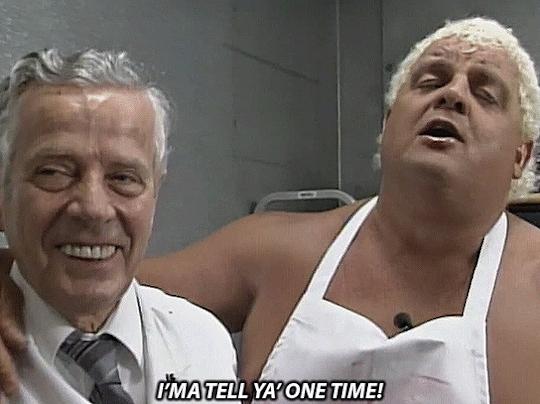
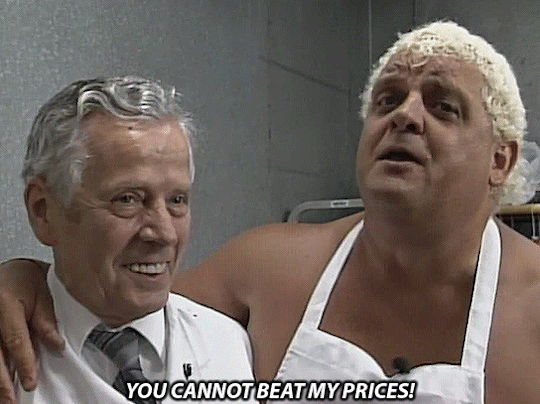
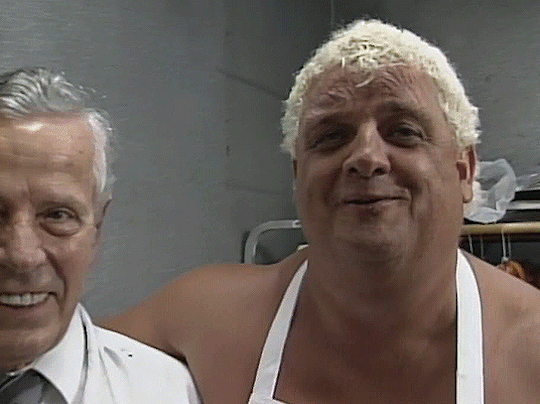
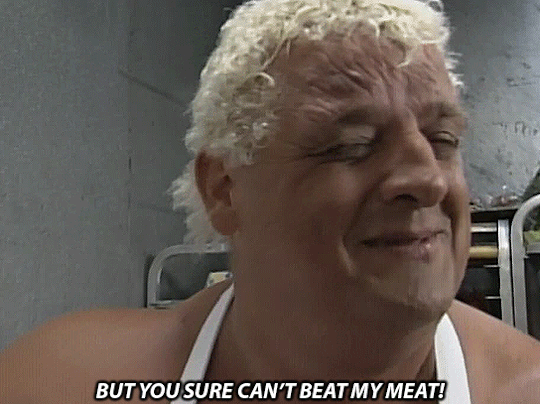

July 10, 1989 -
“The American Dream” Dusty Rhdoes visits a butcher shop on this edition of WWF Prime Time Wrestling.
#Dusty Rhodes#The American Dream#WWF#WWE#World Wrestling Federation#World Wrestling Entertainment#WWF Gifs#WWE Gifs#Wrestling#Wrestling Gifs#AVWWF#AVWWE#AVWrestling#AVWWFGifs#AVWWEGifs#AVWrestlingGifs
68 notes
·
View notes
Text
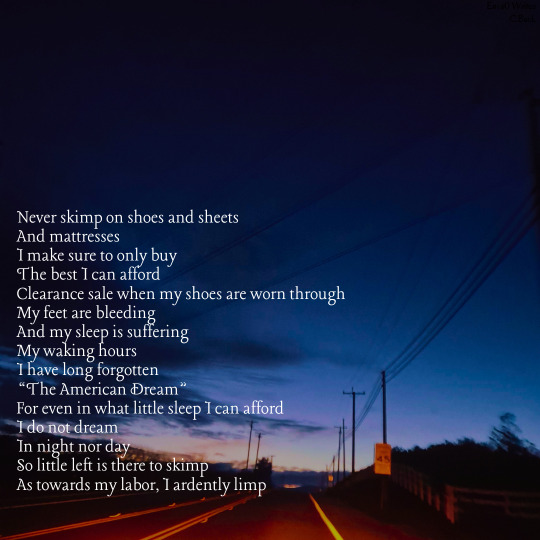
Idle Steps 3.16.24
“XXX.99”
Never skimp on shoes and sheets
And mattresses
I make sure to only buy
The best I can afford
Clearance sale when my shoes are worn through
My feet are bleeding
And my sleep is suffering
My waking hours
I have long forgotten
“The American Dream”
For even in what little sleep I can afford
I do not dream
In night nor day
So little left is there to skimp
As towards my labor, I ardently limp
@env0writes C.Buck
Ko-Fi & Venmo: @Zenv0
Support Your Local Artist!
Photo by @env0
#writeblrcafe#poeticstories#poetryportal#twc#spilled ink#wutispotlight#writtenconsiderations#alt lit#burningmuse#midwest gothic#env0 writes#idle steps#march#capitalism#the american dream#american dream#poor#poor poet#poetselixir#poetswhisper#twcpoetry#writerscreed#abstractcommunity#savage words#smittenbypoetry#poetscreed
15 notes
·
View notes
Text



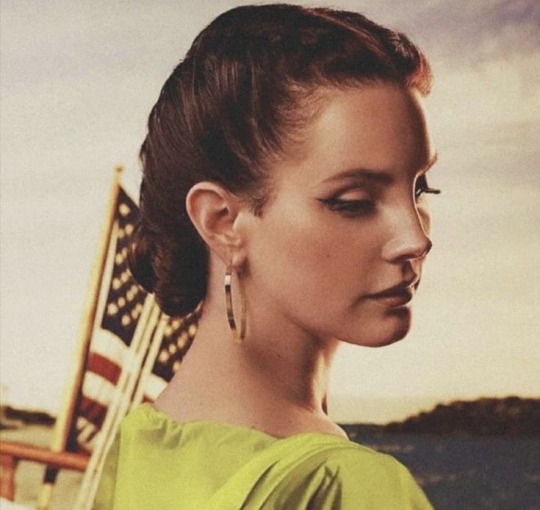

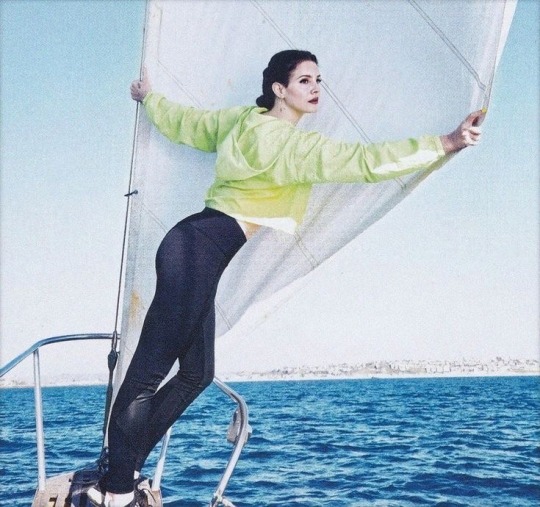

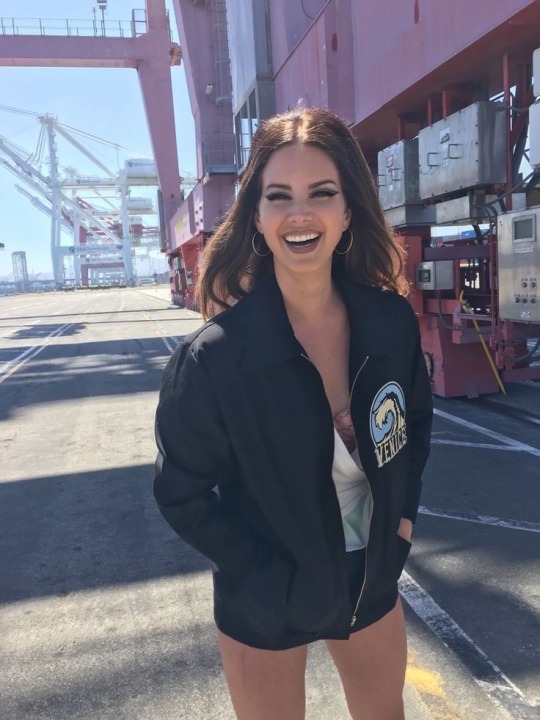
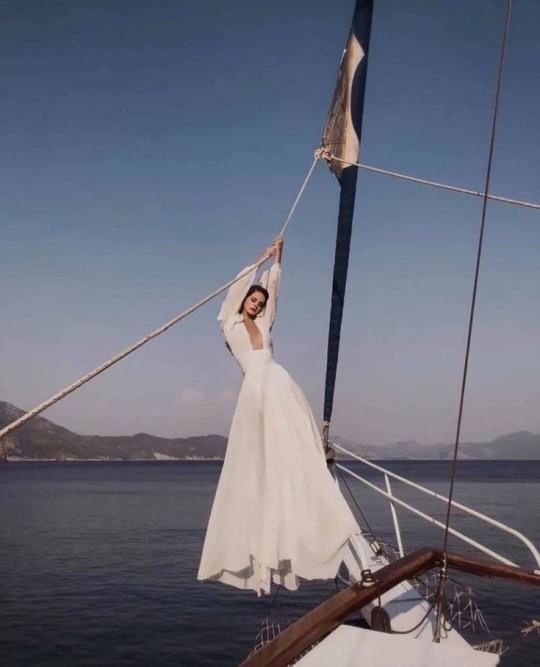
NFR is that album.
#lana del rey#Jack antanoff#nfr#lana del rey is mother#tumblr#photograph#boat#water#music#norman rockwell#the American dream#Malibu#California#sunset#west coast#lana del rey is it#iconic#Jack antanoff universe#the next best American record#guitar#piano#taylor swift#nostalgia#2019#Spotify#Apple Music#1950s#norman fucking rockwell#eagles#American
40 notes
·
View notes
Text

I am sooo happy for him
30 notes
·
View notes
Text

"They slipped briskly into an intimacy from which they never recovered."
F. Scott Fitzgerald, "The Great Gatsby"
#writing#writers and poets#writerscommunity#writers on tumblr#creative writing#literature#writers#writer things#quotes#f scott fitzgerald#the great gatsby#nick carraway#jay gatsby#daisy buchanan#1920s#1930s#zelda fitzgerald#the roaring twenties#the american dream
53 notes
·
View notes
Text
Natalia Cicero Connie Lee Carter Bajar vs The American Dream


"She’s insufferable. The sex would be godawful."
"fuck the protestant work ethic (NOT literally, because it’s the worst 🖕)"
#natalia cicero connie lee carter bajar#the american dream#a starstruck odyssey#the unsleeping city#dimension 20#unfuckability
44 notes
·
View notes
Text
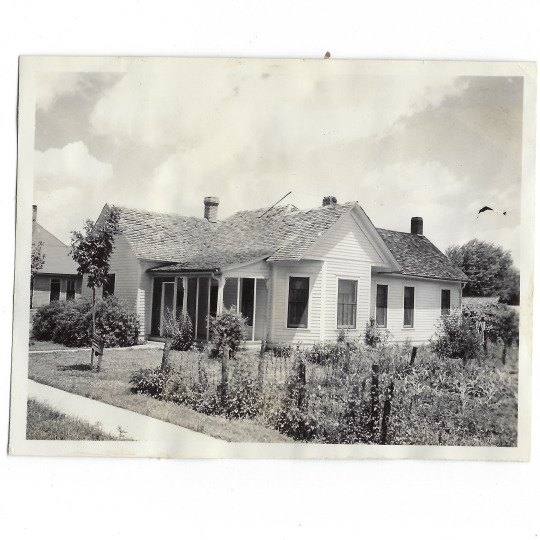
The American Dream. Undated vintage snapshot photo of a small white house with a garden plot.
https://markonpark.etsy.com/listing/1629434796
8 notes
·
View notes
Text
Socioeconomics in The Great Gatsby
Socioeconomics is how economics, or wealth, impacts a person's place in socially. The message to the reader is on the first page when Nick is recalling something his father had told him and the novel states, “Whenever you feel like criticizing any one… just remember that all the people in this world haven't had the advantages that you’ve had.” This tells the reader to be mindful of what they have and grateful for their advantages. The essay “Social Class and Status in Fitzgerald’s The Great Gatsby” shows this in the statement, "The “haves” are those with the control over these things, the natural, economic and human resources, while the “have-nots” are everybody else." The divide between the people who have and the people who don’t is still seen today where we have billionaires with more money than they could ever spend in a lifetime, and people who live paycheck to paycheck. This theme encourages readers to be aware of these differences and these inequalities. Socioeconomics is also the American Dream. The American Dream at it’s core is money and power, that in America everyone has equal opportunity to make money and gain power. This is not the case because, as shown in the book, if you are born rich you have all kinds of opportunities in education and never have to work a day in your life, like Daisy. However, for someone like Wilson it is much harder to make as much money as Daisy because he actually has to work for it and build up from the bottom instead of starting at the top. The characters are divided up into social classes as shown in a quote from the essay “Social Class and Status in Fitzgerald’s The Great Gatsby”, "The Buchanans and Jay Gatsby belong to the class privileged through property and education, Nick Carraway could be considered to be a member of the propertyless intelligentsia and the Wilsons are members of the working class." The class distinctions in The Great Gatsby shows how the American Dream as the illusion that it is giving the message to the reader that not everyone is fortunate and that just because someone works hard, does not mean they will be able to become as wealthy as someone like Daisy or Gatsby. An example of these class distinctions is how Myrtle was treated after her death. They just laid her there for everyone to look at and no one even called a doctor. They didn’t even seem that interested in catching whoever killed her. If this had been Daisy or Jordan in this situation people would have acted much differently and treated them with more respect because of their money and popularity.
Socioeconomics is also shown in the book through cars, boats, and other electronics are used as a sign of socioeconomic succuss. Gatsby has a beautiful car that is new and expensive. It is described in the novel with the quote, “It was a rich cream color, bright with nickel, swollen here and there in its monstrous length with triumphant hat-boxes and supper-boxes and tool-boxes, and terraced with a labyrinth of wind-shelds that mirrored a dozen suns.” Even the connotations of the words used to describe the car, like “rich”, “triumphant”, bright”, and “mirrored a dozen suns”, shows the car is beautiful and fancy. This shows he has a significant amount of money. Wilson on the other hand, doesn't have a nice car and is not wealthy. This is shown by the quote describing his garage, “The interior was unprosperous and bare; the only car visible was the dust-covered wreck of a Ford which crouched in a dim corner.” These two quote show a stark contrast between Gatsby’s car and Wilsons and also a contrast of their lifestyles. Gatsby lives lavishly while Wilson lives without excessive luxury. The cars are also metaphors, Wilson is in the working class, he is building, fixing, and supporting the luxuries the upper class has. However, Gatsby has the nice car, and it kills someone in the working class showing the power he has even if he does no work. In an article from the National Association of Independent Schools, the author sums this up with the statement, “Fitzgerald’s automobile trope, which was connected to/intertwined with socioeconomic status.” The price of Wilsons car reflects his wealth and that connects to his social standings because unlike Gatsby, he can’t afford to have big elaborate paries filled with celebrities and influential people. Gatsby’s parties cost a lot of money and that is shown in the quote, “Every Friday five crates of oranges and lemons arrived from a fruiterer in New York—every monday theses same oranges and lemons left his back door in a pyramid of pulpless halves.” He spends the money every week to provide hundreds of people with food and drinks and entertainment and he has the ability to hold such social gatherings because of his economic success. The car also shows The American Dream. The American Dream is then revealed in the novel when Daisy and Gatsby hit Myrtle with the car. Since Daisy is meant to be this symbol of money that is The American Dream, and Myrtle was shown throughout the novel reaching for The American ream and wanting wealth, like when she got that dog in the beginning and wanting to be with Tom because he had money, it showed The American Dream’s reality crashing into Myrtle and killing her hope for reaching it.
#the great gatsby#jay gatsby#old sport#daisy buchanan#the roaring 20s#socioeconomic#literature#books#books and reading#the american dream
4 notes
·
View notes
Text
#talkin#tik tok#wwf#dusty rhodes#basketball#the american dream dusty rhodes#wrestling#the american dream
22 notes
·
View notes
